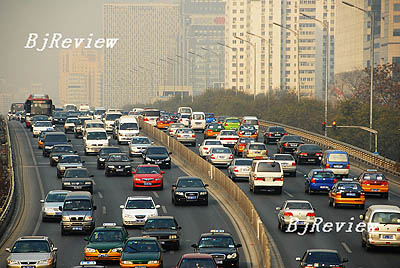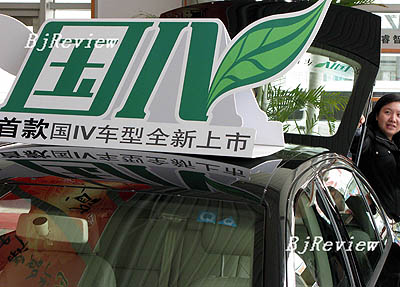|

From March 1, Beijing has implemented a new stricter vehicle emission standard that could lead to cleaner air, but also force thousands of cars off the road. Standard IV, the latest in a series of measures aimed at clearing the persistent smog, will match the current standard of the European Union.
All the new light petro vehicles that are on sale in the Beijing market shall have to meet the new China IV standard and those that cannot fulfill the demands are not allowed to be sold or registered, said Du Shaozhong, Deputy Director of Beijing Environmental Protection Bureau.
In addition, from July 1, all public transport, sanitation and postal service vehicles that run on diesel or natural gas and have a Beijing registered license will meet Standard IV. They are required to have on-board diagnostics installed that will monitor the emission of nitrogen oxides. Before the end of June, all vehicles engaged in construction, long distance transportation, tourism and urban distribution that fail to meet the new standard will be banned from the roads. According to estimations, 1,500 public buses and 2,000 taxis will be replaced by new ones.
Hydrocarbon emissions from vehicles are one of the main sources of air pollution in China, which at the same time causes a massive waste of energy. Other pollutants of vehicle emissions include nitrogen oxides, carbon monoxide and particulate matters. To properly resolve vehicle emission pollution was one of the commitments made by Beijing to the International Olympic Committee.
The number of vehicles in Beijing has increased dramatically in recent years. In 2001, there were 1.12 million vehicles on the city's roads. By May 26 last year, that number had surpassed 3 million. Beijing has without a doubt moved from the bicycle to the car.
Beijing implemented I, II, III standards in 1999, 2002 and 2005 respectively. Each time the standard was lifted to a higher grade reducing pollutant emissions by 50 percent. Standard IV sets higher requirements for engines and according to experts about 30 percent new cars on sale may not meet it.
The 14th phase
"This year we will implement the 14th phase of air pollution control measures," said Du at a press conference in late February. Since 1998, Beijing has taken more than 200 measures to curb pollution, including reducing coal-smoke, vehicle, industrial and dust pollution and implementing ecological protection measures. Beijing's air quality has improved for nine successive years.
According to Du, from 1998 to 2006, Beijing invested 120 billion yuan ($16.9 billion) in improving the environment with a large part put into reducing air pollution.
Beijing monitors pollutant emissions and produces detailed data each day. Compared with 1998, the density of sulphur dioxide, carbon monoxide, nitrogen dioxide and the amount of inhalant particulate matter have been reduced by 60.8 percent, 39.4 percent, 10.8 percent and 17.8 percent respectively.

Levels of the first three of these pollutants have reached international standards, according to the World Health Organization's guiding data. The number of days that the inhalant particulate matter surpassed international levels is on the decline. According to experts, after the implementation of the new standards this year, emissions of carbon monoxide, hydrocarbons, nitrogen oxides and particulate matter will fall to 48,000 tons, 5,300 tons, 4,100 tons and 330 tons respectively.
A good try
On August 17-20 2007, Beijing implemented "the odd-even traffic control system." Under this system, vehicles were allowed on roads on alternating days, depending on whether the license plate number ended with an odd or even number. Theoretically, the number of vehicles on the roads of Beijing was reduced by half.
On those four days traffic conditions improved significantly and emissions of carbon dioxide and other pollutants were reduced by 15-20 percent.
"Limiting the number of cars on the roads is a choice facing many major cities in the world," said Zhu Tong, an expert from the Olympic air quality research team and a professor at Peking University. Before Beijing can find other efficient measures to reduce the emission of car pollutants, limiting the number of cars on the roads and developing the public transportation system are both important measures, according to Zhu.
Beijing Vice Mayor Ji Lin told reporters on March 7 that the "odd-even" measure will be officially implemented in July. "For the vehicles that are forbidden on the roads, the government will introduce an economic compensation policy," he added.
Some Olympic host cities such as Athens, Seoul and Los Angeles also took measures such as restricting vehicles on the roads, said Olympics scholar Holger Preuss, a professor of Johannes Gutenberg-University in Mainz, Germany. However, the measures that are being adopted in China might be the most extensive of all the Olympics. Theses measures might be a real heritage of the Olympics besides the spectacular Olympic venues, according to the scholar.
Du said the environmental measures Beijing is implementing could play an active role in strengthening the people's consciousness of environmental protection. Du is quite well-known in Beijing, because he promotes the idea of using cars less by walking to the office himself.
From June 2006, Du insisted on driving to work two less days a month. "It seems that if one person stops driving for one day they can make little difference, but if 3 million people do it together, it will reduce pollution by one third," said Du. |